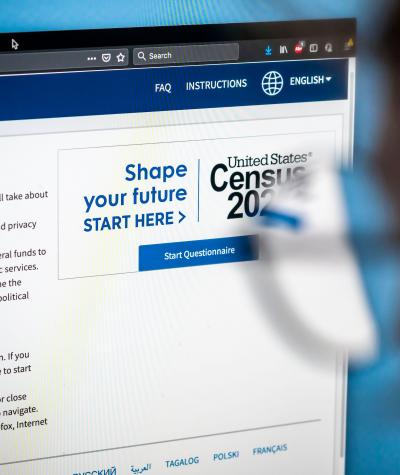The goal of the 2020 Census is to count all U.S. residents where they live on April 1, known as “Census Day.” This task was always going to be monumental, but the coronavirus pandemic has made it clear that a successful census will take an unprecedented effort, both from the federal government and from communities around the country.
Campaign Legal Center (CLC) is committed to doing its part to promote an accurate census under difficult circumstances. As the Census Bureau adjusts its operational plans to cope with the public-health crisis, our focus is on encouraging every household to respond to the census without waiting for an in-person visit from the bureau.
The need to motivate households to self-respond to the census is urgent. As of March 30, the nationwide self-response rate was 34.7% - well below the 47.3% who had responded to the 2010 Census by March 30, 2010. Meanwhile, recent polling by Pew Research Center showed that about a third of U.S. adults could not recall hearing anything about the 2020 Census recently.
The decennial census, which the Constitution explicitly requires, determines how many seats each state gets in Congress and how voting districts are drawn within states. The census also guides trillions of dollars in federal spending throughout the decade. For example, part of the $2 trillion relief package President Trump signed last week will be distributed to state and local governments based on their populations, as determined by the Census Bureau.
The bureau’s primary strategy for counting the population is to try persuading households to submit census responses on their own, then follow up in person to collect information from the households that did not self-respond.
Even under normal circumstances, that latter step – known as “nonresponse followup,” or “NRFU”—is the most expensive and difficult part of the census. However, NRFU is indispensable to a fair census because it helps the bureau avoid an extreme undercount of populations that historically self-respond at lower rates, including immigrants and people of color.
The coronavirus pandemic jeopardizes the Census Bureau’s ability to conduct NRFU effectively. In keeping with expert guidance to practice social distancing as much as possible, the bureau has suspended all field operations until at least April 15 – including the onboarding of temporary field employees, as well as the completion of special programs designed to count people experiencing homelessness, rural communities, and other populations.
In-person NRFU visits for most parts of the country have been delayed until at least late May. Even then, lingering fear of the coronavirus pandemic may affect the bureau’s ability to retain employees for door-to-door NRFU, not to mention individuals’ willingness to open the door for census takers.
By contrast, the bureau’s ability to receive information through self-response does not depend heavily on public health conditions. U.S. residents currently can self-respond online at my2020census.gov, or by telephone at 844-330-2020. Residents can also wait for the bureau to send them a paper questionnaire, which they can complete and submit by mail. These self-response options will be available at least until August 14.
Every household that self-responds to the census is one that does not need to be counted through NRFU. Given the strain that the coronavirus pandemic places on NRFU, the best hope for an accurate census is to collect as many self-responses as possible, minimizing the amount of work to be done with the bureau’s limited NRFU resources.
Despite the disappointing early self-response results, it is not too late for a nationwide surge. All U.S. residents – regardless of immigration status – should self-respond, then encourage their families, friends, and neighbors to do the same. Anyone nervous about self-responding should know that census responses are strictly confidential and can never be shared with law enforcement or immigration authorities. Despite the Trump administration’s failed effort to add a citizenship question, the 2020 Census will not ask about citizenship status.
The next ten years of American democracy depend on the next few months of census data collection. We cannot resign ourselves to a severe and disproportionate undercount, even amid the coronavirus pandemic.

